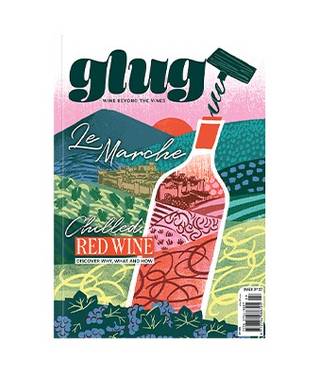Terre de’ Conti
The team speaks to Terre de’ Conti.
Glug Staff
Photo: Terre de’ Conti
Friday 22 September 2023

This article is from
Le Marche
issue 27
Share this article
The Esino river valley cuts through the rolling hills between the majestic Monte San Vicino and the Adriatic, constantly invigorated by the salty, humid air blown in from the sea by the famous north-easterly Bora wind. These particular hills are the main growing region for Marche’s most characteristic native grape variety, Verdicchio, whose minerality, salinity and distinctive crisp bitterness are so instantly recognisable. It is also home to the vineyards of Terre de’ Conti, a traditional family winemaker that is Marchigiano through and through.
Terre de’ Conti was formally established in 2003, though founder Augusto Conti had already been making and selling his blended wines for more than ten years. The critical moment came when Andrea—who had just married Alessandra, Augusto’s daughter—started to work with Augusto. Andrea was a passionate ‘negociant’ and a connoisseur, who had inherited a love of wines from his grandfather Umberto, a farmer and vine grower who would take little Andrea to “help” in his vineyard.
Today, Terre de’ Conti is a really typical Marchigiana family company: Augusto is the ‘ancestor’, Andrea the ‘mentor’. Alessandra Conti, Giulia Conti (Augusto’s other daughter) and her husband Dario are all involved and working in the day-to-day running of the business. It’s a harmonious arrangement that, the family says, results in reliability, success and love for one’s roots.
The Conti family is committed to working with the very best vineyards in the most suitable areas, carrying out the work of winemaking with passion and deep traditional experience. It is very much a homemade approach, impossible to replicate by the large wineries, which delivers a different experience to its customer as well as enhancing the well-being of its territory, its community and the wider environment.
“Terre de’ Conti’s philosophy is to make wines with great typicity,” says the winery’s owner Andrea Corsini. “That’s a word that can sometimes be interpreted quite broadly, but here the land and the microclimate naturally produce wines with a very strong identity. We set out to let those characteristics shine. If you make something too commercial, it might be easy drinking, but you lose the identity. Long term, that means your wine is just like wine from anywhere else; whether it’s cheap wine or good wine, it becomes a commodity.
“So we make wines that speak of where they were made; the minerality, the slight bitterness of Verdicchio. You have to make it in a way so the bitterness is not disturbing, but is still something you can understand from the grape, so the wine is very refreshing and combines very well with food.”
Having worked all over Italy, Andrea is full of praise for Marche, culturally and as a wine region, and sees it as a hidden treasure awaiting those who stray from the beaten track.
“One of the best features of this region is that it’s a little bit outside the main stream of the tourists trail,” he says. “Of course, we have tourists, but we are not Roma! What we have here is real though; we are not isolated people, but some way we are very traditional. And the approach in winemaking—in growing the grapes and vinification—is very traditional, quite small-scale, and very focused on indigenous varieties. That I think makes us different here, and why I believe Marche will become better known.”
Share this article

